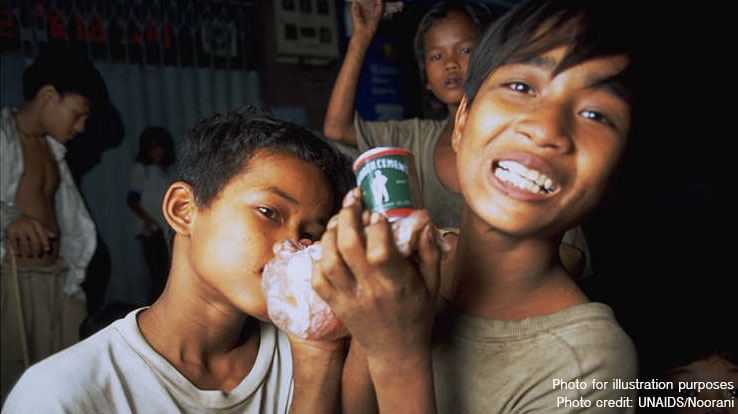Smoke Candy has been sold in Malaysian shops since 2012 (and maybe earlier)
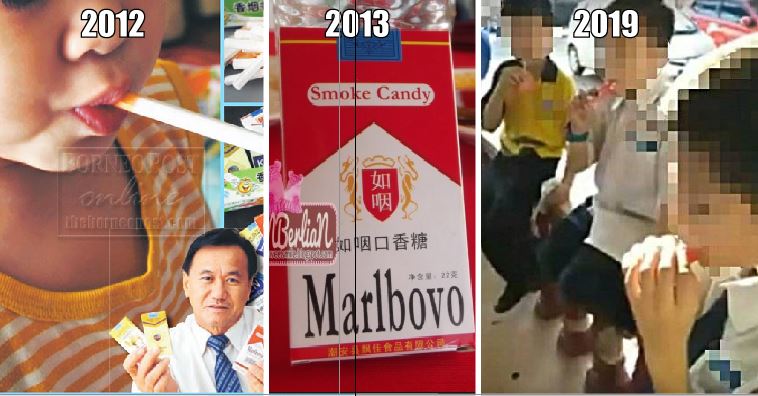
- 922Shares
- Facebook901
- Twitter3
- LinkedIn3
- Email2
- WhatsApp13
Viral videos can sometimes be entertaining for us but some videos raise questions about certain issues. Like this recent viral video, showing 3 kids smoking the Ghost Smoke candy (a.k.a candy cigarettes) in Sabah. They sucked on a cigarette-looking straw and exhaled to puff out smoke.
This sort of sorcery has been a source of worry among parents,who are unsure about its ingredients and potential health impact. And these candies have reportedly spread like wildfire in parts of Sabah, but its source has yet to be traced.

That’s why the Health Ministry’s Food Safety and Quality Unit and the Papar District health office started investigating the selling of Ghost Smoke candy to school kids and whether it contains nicotine. While some of us may be shocked to know this now, others may have heard of this before since…
[Note: the terms “smoke candy” and “candy cigarettes” are used interchangeably in this article.]
These candy cigs have been around for a longer time
These candy ciggarettes have been around A LONG TIME. Some people even seem to remember them in much less glamourous packaging in the 90s.
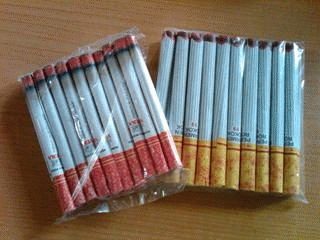
But in mid-2012, it became big news when the guys at Borneo Post visited several convenience stores in Sibu and found that most of the stores sold these smoke candies, which many Sibu kids would know about since these candies were arranged next to other children-targeted snacks.
These made-in-China candies were packed in boxes that resemble real cigarette boxes, even bearing the names of the tobacco brands themselves. The boxes were so similar to the real cigarette boxes that they didn’t have any nutrition or food certification labels, but instead, had the product serial number and permit number printed just like the real ones.
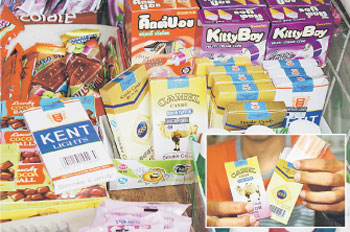
One of the shopkeepers the Borneo Post crew met admitted that he got the smoke candies from a local supplier.
“Suppliers will send items to my store in bulk quantities including these sweets and most of the items shipped are made in China.” – the shopkeeper told Borneo Post.
A consumer aged 25 also told Borneo Post in 2012 that she’s seen smoke candies since her schooling days (which was pretty long ago) when her peers were going crazy over these sweets which gave them a chance to mimic the adult smokers. Some of you would have done that when you were kids, right?
That’s probably why, in the following year, the Food Safety and Quality Unit (the same guys investigating the current Ghost Smoke candy case) issued a warning to businesses to stop selling these candies or risk getting them confiscated (or facing a 3-year jail sentence or a fine or both). Looks like it paid off in Sarawak since recent checks by the authorities have so far proved that these candies are no longer sold in Sarawak… or maybe not since 14 boxes of ‘Chost Somke’ were seized in Kuching more recently.
“These smoke candies, I am sure will arouse curiosity among little children. Now children may be sucking them (smoke candies) for the fun of it but we will never know, as they grow up, they might pick up the habit of smoking cigarettes.” – said Wilbert Kho, the unit’s superintendent, in 2013.

But such measures in Sarawak didn’t reach Taman Melawati since smoke candy sellers there still took the risk of violating the Food Regulation Act 1985 by selling these disputed sweets to school kids in 2014. Doesn’t seem to have done much, since the Consumers Association of Penang (CAP) as recently as 2017 have found youngsters who consume this smoke candy.
And remember when we mentioned that these candies were made in China? Well, maybe it wouldn’t be too shocking to know that China faced the same issue at the same time the Malaysian Food Safety and Quality Unit took action in Sarawak in 2013. China shared the same concerns about kids romanticising the idea of smoking, maybe just like daddy. And such concerns weren’t limited to Malaysia and China.
It’s everywhere, and people are probably right to worry
Our editor (who’s turning 40 in 2 months) actually remembers as a kid he had heard about these smoke candies before. In fact, because he couldn’t get his hands on it, him and his classmates actually rolled up scrap paper, and coloured the tips orange to make them look like ciggarettes. Sigh. Lame.
The roots of smoke candies can be traced back to its earliest ancestor, ‘chocolate cigarettes’, in 19th century US. Around the mid-20th century, tobacco companies allegedly started allowing candy cigarette manufacturers to use cigarette box designs for their packaging (after battling it out in court for copyright reasons), raising many eyebrows that tobacco companies were doing this to lure kids into becoming future tobacco users.
If that really was a tactic to raise future tobacco demand, then it’d be safe to say that this tactic worked, as research (by Klein JD et al for Pediatrics in 1992 and Klein JD et al for Preventative Medicine in 2007) has proven a positive relationship between childhood consumption of candy cigarettes and adulthood smoking habit. The lead researcher Jonathan Klein explained that these products desensitize kids and make them more receptive to the idea of smoking.
“It strikes me as insane that we would manufacture candy that would teach kids how to use a product that will kill half of them.” – said Danny McGoldrick, research director for the US-based Campaign for Tobacco-Free Kids.
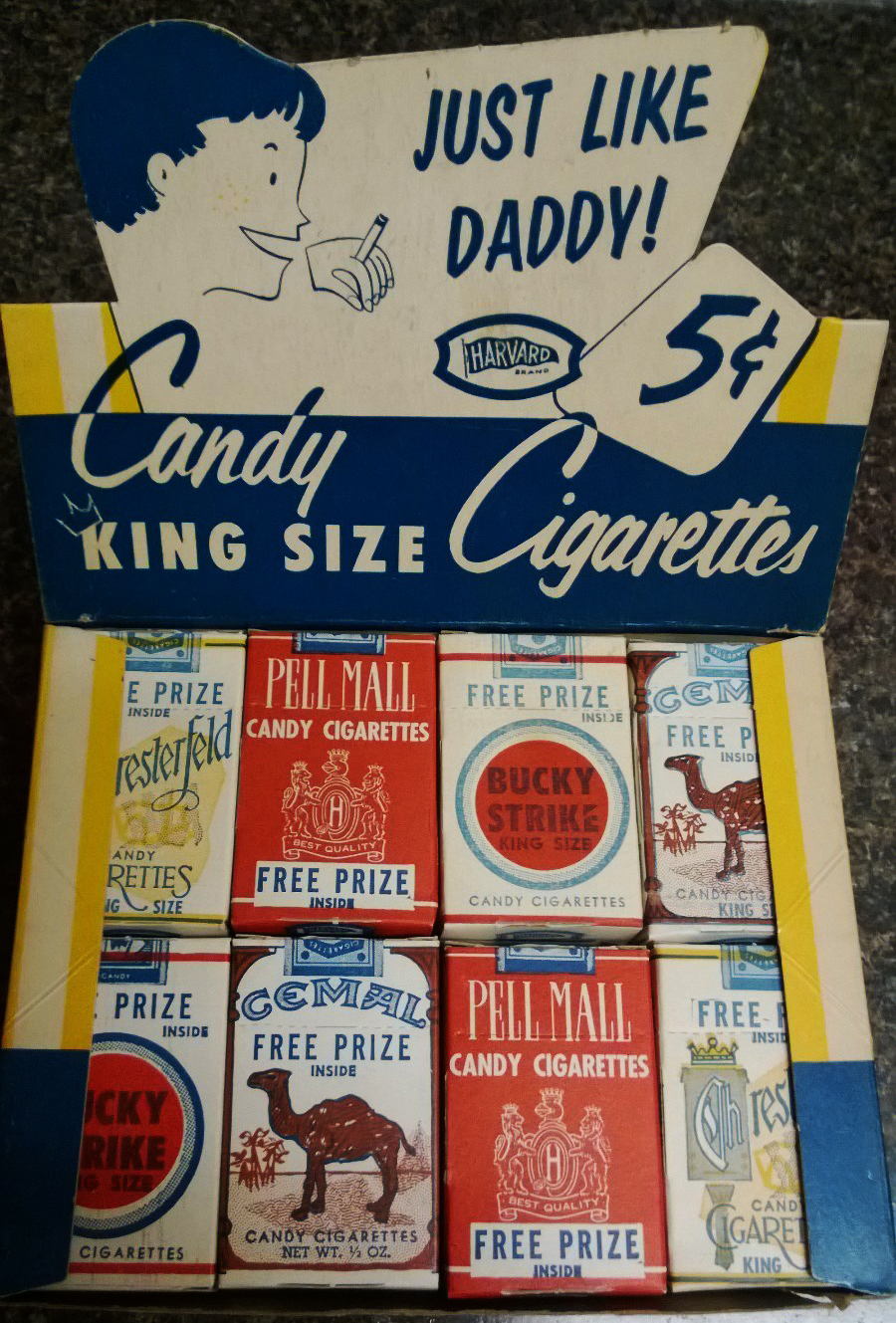
Even if the candy cigs don’t attract kids to tobacco, these things are made of 75-80% sugar and the rest gelatin, so of course there’s also the risk of a lifetime of insulin jabs and side-effects. While the US resorted to replacing the word ‘cigarettes’ with ‘sticks’ to remove its link to the idea of smoking, many other countries like Brazil, Finland, Norway, Turkey and Saudi Arabia have banned the sale of these products.
A similar ban is being considered in Malaysia and one prominent figure who is calling for it is our Deputy Prime Minister Wan Azizah, who added that it’s possible for Ghost Smoke to be the beginning of a drug addiction problem.
“I don’t want this matter to become a social ill spreading to children from a young age… Previously it was smoking, then drugs, and later syabu.” – said Wan Azizah.
Her concern was shared by the Health Minister Dzulkefly Ahmad, who said the Health Ministry would work closely with the Domestic Trade and Consumer Affairs Ministry (KPDNHEP) to prevent the spread of these candies.
“We have observed the issue and will take immediate action. We cannot allow it.” – said Dzulkefly.

KPDNHEP has already started cracking down on the candies around Papar and other areas in Sabah while the Sabah Health Dept confiscated 766 of these candies in towns across the state for false labelling offences under the Food Act 1983. The dept has also sent circulars to schools in the Papar district to alert them about the sale of smoke candies and urge them to monitor their students.
“However, our jurisdiction lies within the school grounds, so we can make sure that our school canteens do not sell these candies.” – said Sabah Education Dept director Mistirine Radin.
These actions should also not be limited to Papar, as Tuaran is also facing the same issue, according to Deputy Chief Minister Wilfred Madius Tangau.
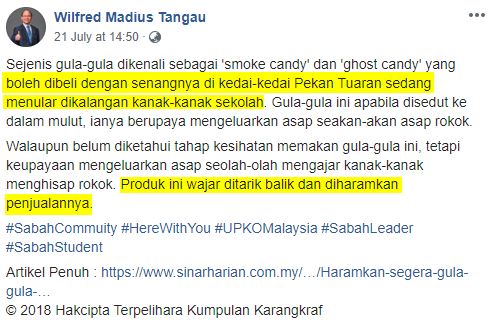
“I wish to remind parents on the pocket money they give their children to prevent them from buying unnecessary things.” – said Aminolhuda.
- 922Shares
- Facebook901
- Twitter3
- LinkedIn3
- Email2
- WhatsApp13



